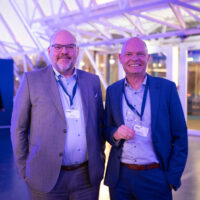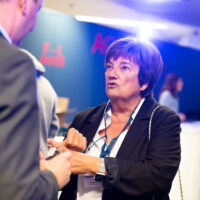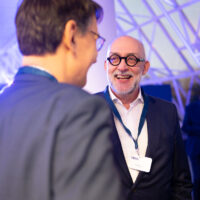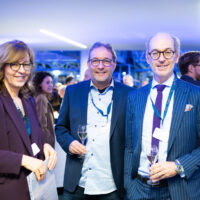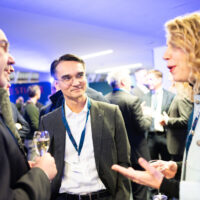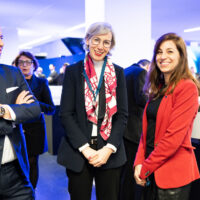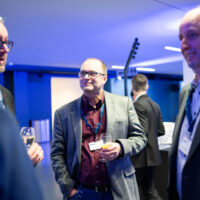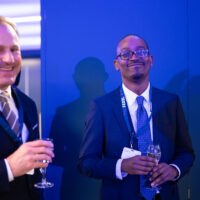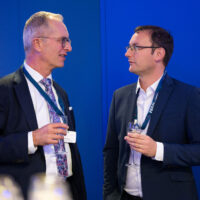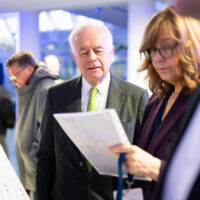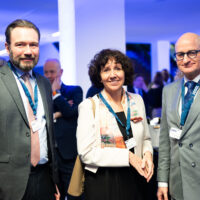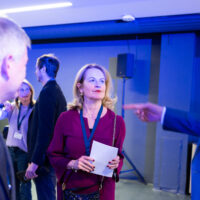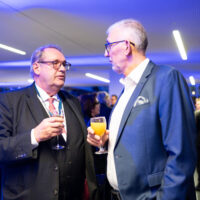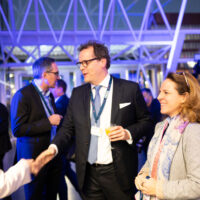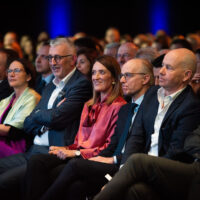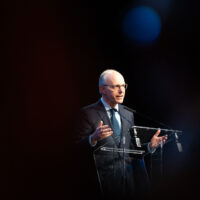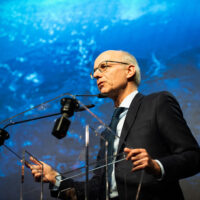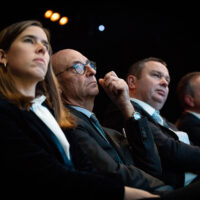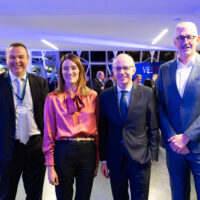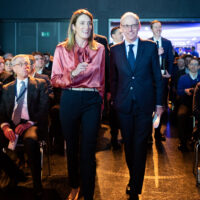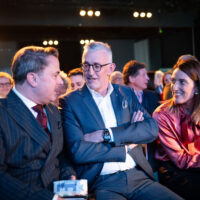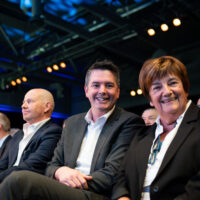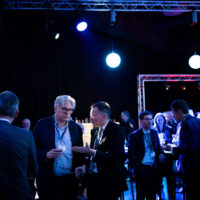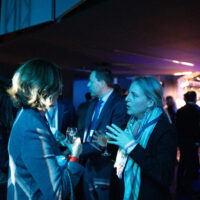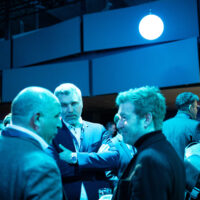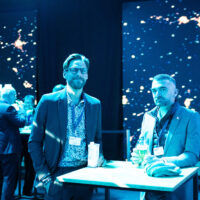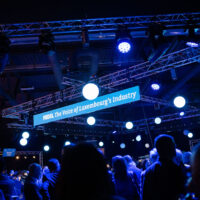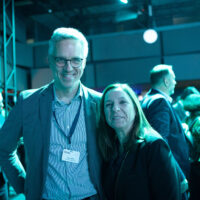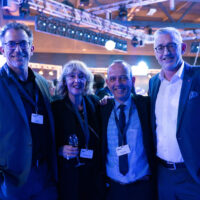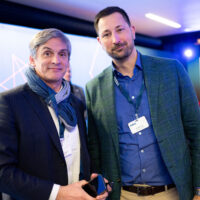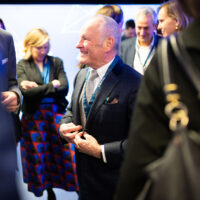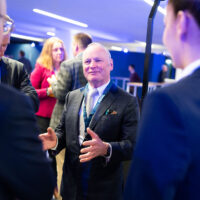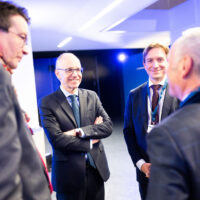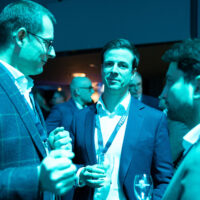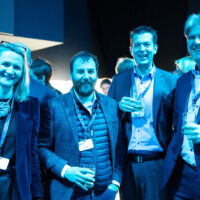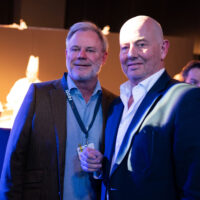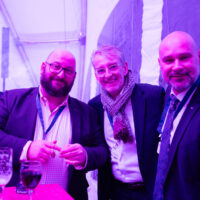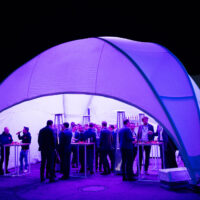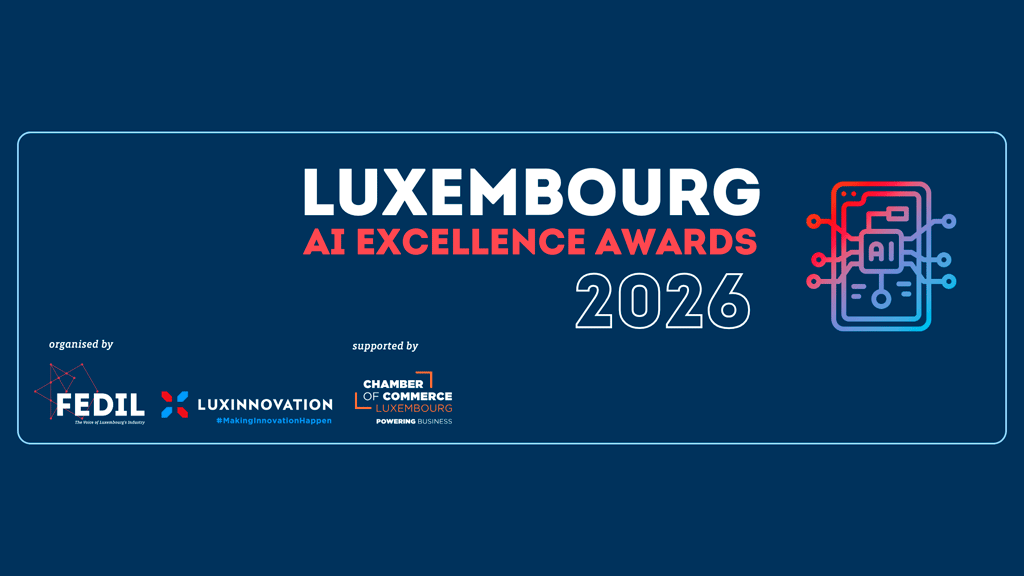FEDIL was delighted to welcome a large number of guests to its „New Year’s Reception 2025“ on 16 January at Luxexpo. The evening was marked by the presence and address of Prime Minister Luc Frieden, the keynote speech by Roberta Metsola, President of the European Parliament, and the message from FEDIL President Georges Rassel.
Geopolitical shifts and uncertainties affecting global trade relations, the responsibility of European policymakers imposing new standards and requirements, overregulation, the Green Industrial Deal, a coherent and realistic energy transition, economic growth and competitiveness of the European industry, modernization of labour laws, innovation and new technologies – all these topics that shape our future, were addressed during the different speeches.
In keeping with tradition, a great deal of time was devoted to networking, which was so much appreciated by all! FEDIL would like to extend its warmest thanks to the sponsors who made a major contribution to the success of our New Year’s reception: BGL BNP Paribas – Groupe Foyer – LuxConnect – Office du Ducroire Luxembourg – Société Nationale de Crédit et d’Investissement – Landewyck – Amazon – Losch Luxembourg – LuxAirport – Luxexpo the Box – Codex – Imprimerie Centrale.
Address by Georges Rassel at the New Year's Reception 2025
Dear Prime Minister,
Dear President of the European Parliament,
Ministers,
Ladies and Gentlemen Members of Parliament,
Dear members of the European Parliament,
Your Excellencies,
Esteemed members of FEDIL, dear guests,
As we gather here today to welcome a new year and reflect on the past one, it is a great honor for me to address you on this significant occasion. The turn of the year is always a time for both reflection and projection, and I am eager to share FEDIL’s thoughts on several pressing concerns of today that will shape our future.
Looking out into the audience, I see that you are again numerous to be here today, from the business community, academia and research as well as from the political and administration side, even though no elections are scheduled this year. And I am very happy to be able to do that in the presence of Mrs Roberta Metsola and of Mr Luc Frieden whom I would like to thank very much for being with us tonight and for addressing our audience later-on, despite their very busy schedules. We particularly appreciate that you were able to plan your participation here at such short notice. Thanks a lot.
I know that there is probably a high interest in the exceptional networking event right after this official part of the evening, but I also believe that your presence shows that our messages and recommendations are welcome and hopefully also well appreciated.
So, thank you all for joining us here today!
First, let us consider the current geopolitical landscape. Today’s world is marked by increasing uncertainties and tensions. Peace is no longer a given, even in our part of the world.
As Winston Churchill once said, „The farther backward you can look, the farther forward you are likely to see.“ Learning the right lessons from the past in order not to make regrettable mistakes in the future. Defence capabilities and international cohesion among partners are key factors in this equation. The current unclear political situation in many European countries does not favour a common position to address these challenges.
The geopolitical shifts have substantial ramifications for our economies and businesses. We must remain vigilant and adaptable to navigate these uncharted waters successfully.
The global balance of power is continuously evolving and one of the most immediate consequences of the changed geopolitical scene is the difficulty in maintaining smooth trade relations. Tariffs, sanctions, and protectionist policies are becoming more common, affecting the flow of goods and services. We, as a business community, must advocate for fair trade practices that encourage rather than hinder economic growth. Europe’s economy is dependent on imports and exports and Luxembourg’s economy even more. So, we expect our government to carry the flag of free trade high and convincingly. It seems that while we are trying to build bridges, others are busy building walls! But isn’t that a bit of a distorted picture?
It is a common European reflex to criticize future President Trump’s trade-related intentions. Rightly so, if all plans he announced before taking office, became reality. But what about us? Is Europe completely innocent in this trade related downward spiral? These last years, European policymakers have adopted several pieces of legislation designed to impose our principles, standards and performances on our trading partners. Deforestation, CSRD, CS3D, CBAM, … . Of course, we can claim that these principles, standards and performances have a universal value and that every country and every foreign producer should comply with them. But we know that not all countries share these requirements and several of them refuse what they call an exaggerated interference from the old continent. Three weeks ago, Qatar threatened to stop EU gas sales if fined under EU due diligence law. One can assume that other suppliers of essential goods will follow suit. In such circumstances, it is uncertain whether our economy can cope with our own requirements.
In a few years’ time at the latest, we will have to assess the effectiveness of certain regulations and their restrictive effect on sales and supplies crossing the European borders. Any undesirable developments and inconsistencies will have to be ironed out immediately. Rightly so.
FEDIL will strengthen its team and its advocacy on trade and, more specifically, on new standards and protective measures and their possible collateral effects on supplies and sales. Who wouldn’t wish for the good old days when trade policy was boring? Well, times are changing, and we must adapt.
Europe is experiencing a worrying decline in competitiveness. In his report to the EU Commission, Mario Draghi bluntly explained how high energy costs, inadequate investment in innovation and excessive regulatory burdens have contributed to this trend. It is imperative that we address these issues head-on to restore Europe’s competitive edge on the global stage.
Speaking of regulatory burdens, overregulation remains a significant challenge. While regulation is essential for ensuring fair practices, mitigate risks and protecting the environment, excessive rules can stifle innovation and economic growth. We need to find a balance that maintains high standards without placing undue burdens on businesses.
As of today, a significant storm of regulation from the Northwest is heading towards our companies.
Considering the magnitude of recent EU regulation in the areas of sustainability, digital or employment relations, the occasional and very welcome simplification measures here at home in Luxembourg look pretty much like fighting a tornado with a hairdryer.
We therefore strongly appreciate that the European Council and the Commission recognize some of their recent errors and see the need for major corrections and simplifications to be made. We hope that their good intentions will also find a majority in the European Parliament.
Couldn’t we agree on a regulatory holiday of at least three years? This period could be used to clean up the existing surcharge and it would give companies room to implement the remainder.
Our role as a business organization is to submit constructive proposals in line with the companies’ will to meet higher standards while ensuring the continuation of their European activity in the context of international competition. Europe is on the brink of losing a significant share of its strategic manufacturing capacity. You can see it in the statistics, you can read it in the newspapers and the trade unions can tell you the rest of the story. The clock is ticking.
FEDIL undoubtedly recognizes and supports the need for environmental sustainability, and the Green Industrial Deal is a significant step in the right direction. However, it is crucial that we approach this transition with pragmatism and that we treat it as a societal undertaking in order to prevent it from becoming a source of huge additional cost and concern electricity consumers.
An overly ambitious timeline and an undifferentiated approach when it comes to the options for action of individual sectors can lead to economic disruptions and social challenges. We must advocate for a more coherent and realistic energy transition that considers both environmental imperatives and economic realities.
Let me give you two examples that illustrate my thoughts:
Our PNEC – the national climate and energy plan – has foreseen a very ambitious GHG-reduction path for the manufacturing industry. Together with the government, FEDIL is promoting supportive instruments that encourage companies to decarbonize by means of electrification. Now, since the entry into force of the new CSR Directive, companies are forced to monitor, report and improve their carbon footprint, including scope 2 emissions, meaning those emissions related to their electricity consumption. Guess what? Given the high carbon intensity of our imported German electricity, it makes no sense in the short term for our industries to replace gas by electricity in their Luxembourg production units if their decision is CSRD-driven. That’s what I would call an incoherent way to do politics.
This leads me to my second example: During last autumn, the German electricity market showed increasingly worrying signs of shortness and related high spot prices, when the sun and wind failed, and coal-fired power plants, supposed to disappear in a few years’ time, were essential to keep the balance alongside significant levels of imports. When attending meetings at European level, we notice a decreasing willingness to invest in additional interconnection capacities within the EU due to diverging energy policies in different countries. Indeed, several countries or regions don’t want to get infected by the weaknesses or inconsistencies of others. Just last month, the Swedish energy minister complained about Germany exporting its energy problems to neighboring markets and announced the termination of an interconnector between Sweden and Germany.
An invitation, or should I say a call for Luxembourg to consider all options internally and within the Greater Region in order to ensure an affordable, secure and well-balanced power supply? The necessary and hopefully swift reinforcement of our high voltage grid is only part of the equation.
Ladies and gentlemen,
Here in Luxembourg, the new government has completed its first year in office. It is an opportune time to review its actions and the impacts of some of its policies. The government has shown a strong commitment to put competitiveness back on the agenda. Tax relief and the launch of several consultation processes deemed to significantly reduce red tape and permitting procedures, are appreciated. FEDIL’s exchange with elected representatives and Administration has so far been open and mostly constructive. Thank you for this.
The latest STATEC estimates indicate a modest half percent growth for the Luxembourg economy in 2024. With twice + 2,5%, the growth forecasts for this year and 2026 are more positive.
However, some sectors, particularly construction and several, mostly energy-intensive, industries, still face significant challenges. The ongoing crisis in the building sector has required immediate and effective interventions. The government, together with the affected sector, acted to relaunch private investment. It remains paramount to reach a particularly high level of public counter-cyclical building investments in 2025.
The government’s intention to modernize labor laws is a positive and necessary step. A dynamic and fair labor market is crucial for economic growth and social stability. By updating labour laws, we can ensure that they meet the demands of the modern world of work, supporting both employers and employees in achieving their full potential.
We very much regret the extremely negative and even threatening attitude of the trade unions after the first ministerial soundings about this topic. Together with my colleagues at UEL, we hope that essential elements of the government’s intentions in this area will survive this process, so that social dialogue in general can be stimulated and favored at an adequate level. In this respect, the fact that the government has just confirmed the collective agreement as exclusive door opener for exemptions to legal shopping hours might be a cause for concern.
But we remain confident that the major challenges related to employment relationships can be addressed effectively. This also includes making a necessary correction when absenteeism is far too high. The latter is certainly a management matter, but many companies feel abandoned without legal or official intervention. Operational disorganization and the frustration of fair-playing employees in the event of excessive or abusive absences cause costs and damage the working atmosphere.
Prime Minister,
We see a window of opportunity for a major improvement of our regulatory framework. Part of it needs to become more manageable, more realistic. We are counting on you to support this endeavor within the European Council. And we are also counting on you when the government has to work out law bills implementing legal requirements from Brussels.
But let me extend my thoughts a little further:
Many new pieces of legislation come together with the introduction of additional regulators who join the already long list of existing authorities to which reporting must be done. Over the December holidays, we read in the economic press that British Prime Minister Keir Starmer wrote to more than ten regulators in his country (financial, competition, energy and so on …) asking them to remove barriers to growth in an effort to revive a sluggish economy. According to press reports, the message, co-signed by Finance minister Rachel Reeves, was unambiguous on the need to prioritize economic growth and investment.
Multinational companies within our membership, meaning those which have the capacity to compare competitive advantages, tell us that access to regulators, their efficiency and their interpretation of existing rules have become key investment criteria in our highly regulated business world.
We are very willing to deepen discussions on such a promising initiative with your government. Returning to growth is a task that concerns us all.
Dear all,
This evening, I do not want to address the major challenges that are looming for the long-term financing of our social security system. The relevant committees should clarify this carefully and based on realistic growth scenarios and the associated calculations. FEDIL, with our partners in the UEL, is supporting this process, because facts and figures clearly show that it is the right moment, now, to discuss the sustainability of our highly appreciated pension scheme. Employers and employees, both from the private and public sectors, should agree not to push back this topic. Ultimately, responsible political decisions must be made. Our children and grandchildren are looking at us!
Ladies and gentlemen,
When speaking about the challenges ahead, we are convinced that economic growth is necessary to meet them. Several target ratios in addressing these challenges derive from our GDP performance, such as spending on defence, on public R&D, on supporting selected developing countries a.s.o … And several of these target ratios are supposed to increase in the coming years, which raises questions of prioritization and financing. My colleague, Business Europe’s President Frederik Persson, often expresses the following consideration on this issue. I quote: “Instead of focusing the debate exclusively on percentage points, we all should agree that the cake to be divided should become bigger, …. hence it is better to speak to the baker first ….”
And there are many bakers in the room tonight!
I am convinced that talented people, entrepreneurship and innovation are key to addressing many of the issues we face today.
That’s why I am optimistic about the future economic development of Luxembourg. Our country has the potential to prosper, thanks in large part to the visionary leaders and so many other talents within our companies. These individuals inspire innovation and drive progress, ensuring that we remain at the forefront of global business.
Last December, we celebrated the FEDIL Innovation Awards. Looking at the quantity and quality of the many submitted projects, we can see that Luxembourg is becoming more and more innovative.
I am convinced that there is still room to improve, for instance by strengthening the cooperation with and between all stakeholders in the research and innovation ecosystem.
We also need more adequate financing solutions, which allow start-ups to progress to the next level without having to leave our country or even the continent. And yes, there will also be some risk money required!
I am particularly excited about the potential that lies in new technologies, especially artificial intelligence. AI has the power to transform industries, streamline processes, and enhance decision-making, offering us unprecedented opportunities for growth and efficiency.
By harnessing these advances, we can propel ourselves into a new era of economic prosperity. Competing economic regions will do so, why shouldn’t we, why couldn’t we? … Do we have a choice?
Equally important is the unwavering support of the Luxembourg government. Its commitment to modernizing our economic landscape is crucial. By correcting previous missteps and focusing on sustainable growth, we have a clear formula for success.
Together, with visionary leadership, innovative and sustainable technologies, motivated and committed workforce and strong governmental support, we can build a bright future for Luxembourg.
Many thanks to our member companies, to our partners, to people involved in our board and project groups and to our permanent team at FEDIL for your dedication and contribution to this exciting journey ahead.
Thank you, and I wish you and your families a prosperous and successful New Year and let’s make the cake bigger together!
Video of the address by Roberta Metsola, President of the European Parliament

